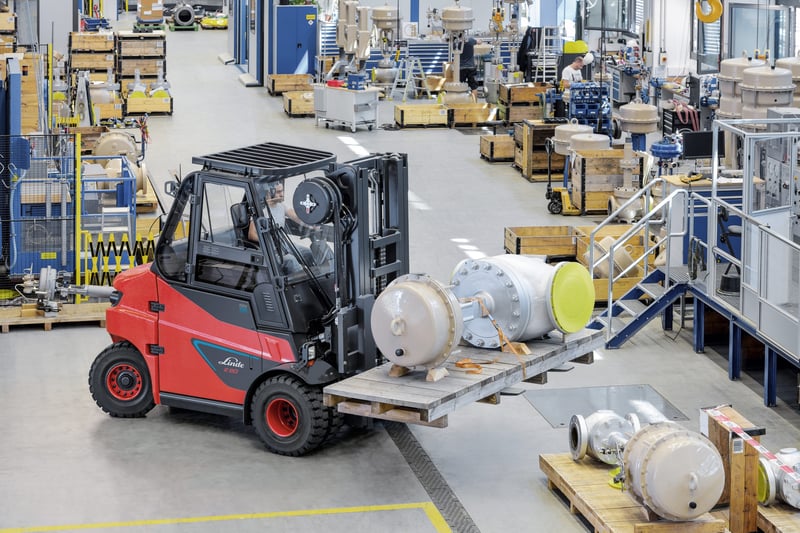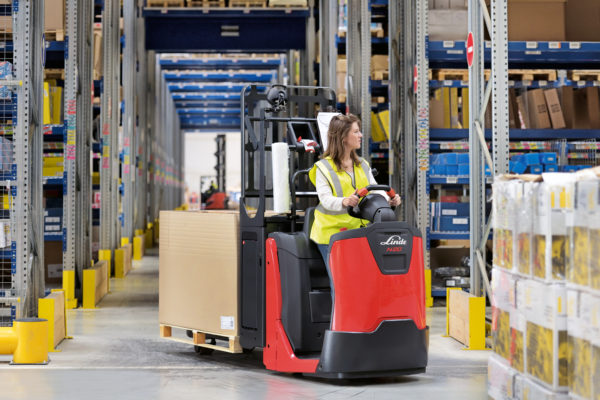
KION Group makes a solid start to a year of huge challenges
2450 West 5th North St.
Summerville, SC 29483
Phone: 843 875-8366
Fax: 843 875-8329
http://www.kiongroup.com
KION Group makes a solid start to a year of huge challenges
- Total value of order intake declined by 1.8 percent to €2.081 billion
- At €3.629 billion, the order book is almost unchanged at the end of 2019
- Revenue decreased by 2.7 percent to €2.028 billion
- Adjusted EBIT falls to €144.0 million (Q1 2019: €182.4 million),
- Adjusted EBIT margin stands at 7.1 percent (Q1 2019: 8.8 percent)
- Net income for the period decreases by 27.2 percent to €67.8 million
- Free cash flow amounts to minus €222.1 million
(Q1 2019: €82.0 million), partly due to acquisitions
Despite challenging market conditions and the coronavirus pandemic, the KION Group made a solid start to the year overall thanks to a strong performance in January and February before the full impact of the outbreak took hold. In March, the effects of coronavirus began to be felt beyond China as it spread around the world, disrupting the supply chains of the Industrial Trucks & Services (IT&S) segment and impairing its business performance. The Supply Chain Solutions (SCS) segment with its focus on automation solutions, on the other hand, was able to build on the positive performance of previous quarters.
The value of order intake for the KION Group fell by just 1.8 percent to €2.081 billion in the first quarter of 2020 (Q1 2019: €2.118 billion). While the Industrial Trucks & Services segment reported a 7.7 percent drop in order intake to €1.394 billion (Q1 2019: €1.511 billion), the Supply Chain Solutions segment registered a significant increase of 13.8 percent to €686.3 million (Q1 2019: €602.9 million), thanks in part to strong demand for automation solutions. The market for material handling solutions remained intact in the first quarter, driven primarily by the growth in global e-commerce. The order book was almost unchanged, ending the quarter at €3.629 billion compared with €3.632 billion as of December 31, 2019.
 Consolidated revenue fell slightly, by 2.7 percent, to €2.028 billion (Q1 2019: €2.083 billion). This was due in no small part to a slump in the Asia-Pacific (APAC) sales region for the IT&S segment, as the spread of coronavirus was already having a significant impact on the economy in China at the beginning of the year. Adjusted EBIT for the KION Group was significantly down on the figure for the prior-year period at €144.0 million (Q1 2019: €182.4 million); the adjusted EBIT margin was 7.1 percent (Q1 2019: 8.8 percent). Net income for the period January to March fell by 27.2 percent year on year to €67.8 million. This decline in earnings was driven primarily by the growing impact of the global spread of the coronavirus pandemic. In the Industrial Trucks & Services segment, this caused huge damage to business operations, in terms of both procurement and sales, first of all in China at the start of the year and then in other parts of the world, especially Europe. At the same time, free cash flow fell to minus €222.1 million, compared with a positive figure of €82.0 million in the first quarter of 2019. In addition to the drop in earnings, cash flow was also negatively impacted by a sharp increase in working capital in the first quarter, which resulted in a net cash outflow of €121.6 million (Q1 2019: €43.4 million). Cash flow from investing activities included gross payments of €94.6 million for the acquisition of UK software company Digital Applications International Limited (DAI).
Consolidated revenue fell slightly, by 2.7 percent, to €2.028 billion (Q1 2019: €2.083 billion). This was due in no small part to a slump in the Asia-Pacific (APAC) sales region for the IT&S segment, as the spread of coronavirus was already having a significant impact on the economy in China at the beginning of the year. Adjusted EBIT for the KION Group was significantly down on the figure for the prior-year period at €144.0 million (Q1 2019: €182.4 million); the adjusted EBIT margin was 7.1 percent (Q1 2019: 8.8 percent). Net income for the period January to March fell by 27.2 percent year on year to €67.8 million. This decline in earnings was driven primarily by the growing impact of the global spread of the coronavirus pandemic. In the Industrial Trucks & Services segment, this caused huge damage to business operations, in terms of both procurement and sales, first of all in China at the start of the year and then in other parts of the world, especially Europe. At the same time, free cash flow fell to minus €222.1 million, compared with a positive figure of €82.0 million in the first quarter of 2019. In addition to the drop in earnings, cash flow was also negatively impacted by a sharp increase in working capital in the first quarter, which resulted in a net cash outflow of €121.6 million (Q1 2019: €43.4 million). Cash flow from investing activities included gross payments of €94.6 million for the acquisition of UK software company Digital Applications International Limited (DAI).
Challenging market trend
In the first quarter of 2020, the measures taken by many countries to contain the coronavirus pandemic weighed heavily on the global economy.
The global market for industrial trucks contracted sharply in the first quarter of 2020. At 346,210, the number of new trucks ordered was down by 9.4 percent compared with the first quarter of 2019. The APAC region was particularly hard hit, with the number of orders lagging 17.3 percent behind the figure for the first quarter of last year. New orders in the EMEA region (western Europe, eastern Europe, the Middle East, and Africa) fell by 5.2 percent. The Americas region (North, Central, and South America), by contrast, managed a slight increase of 1.9 percent compared with the prior-year period. New orders for IC trucks fell by 18.1 percent, primarily due to the temporary slump in demand in China. The decreases in order intake for electric forklift trucks (down by 9.0 percent) and warehouse trucks (down by 2.4 percent) were slightly less pronounced.
The growing economic slowdown and accompanying reluctance to invest also impacted the market for supply chain solutions. The knock-on effect for suppliers of warehouse automation solutions was the postponement of projects, particularly in the clothing and consumer durables sectors. According to the KION Group’s estimates, however, the e-commerce, food, beverage, and pharmaceutical industries continued to perform well.
KION remains a key partner for its customers around the world during the coronavirus crisis

Gordon Riske
“The KION Group is playing a critical role in maintaining supplies to the general public during the current pandemic,” said Gordon Riske, Chief Executive Officer of KION GROUP AG. Systemically important sectors at present are healthcare, pharmaceuticals, food production, logistics, and food retail – precisely those sectors from which KION draws a large number of its customers. The industrial trucks of the KION brand companies and the material handling solutions of KION subsidiary Dematic are ensuring the efficiency of logistics operations for these customers. “We are helping to meet the basic needs of the population, to keep supply chains up and running, and to get critical supplies to the healthcare sector. We stand ready with our truck fleets both for our customers and for official aid organizations,” added Riske. This applies in respect of both service support and the provision of spare parts. These aspects are particularly important to our customers and therefore to all of society during the current exceptional circumstances.
“Our production operations were temporarily suspended at some plants during the Easter holiday period in order to allow stocks of materials to be brought back up to sustainable levels again following recent supply difficulties. These operations are now being rapidly ramped up again,” stressed Riske. However, demand is lower than usual in many of our customer industries, partly as a result of production shutdowns. “As things currently stand, we can expect to see a gradual easing of restrictions by authorities in the most severely affected European countries and in the US in the course of the second and third quarters,” explained Riske. “I am very confident that we will emerge stronger from this crisis. After all, we will continue to perform a key function for the entire system in the future.” (see also: https://bit.ly/2Ko8fUa)
Segment performance in detail
In the Industrial Trucks & Services segment (industrial trucks, warehouse technology, and related services), the KION Group’s brand companies took orders for 45,861 new trucks during the first three months of this year, a
14.2 percent reduction in the prior-year period. In China, however, there are now clear signs of recovery in the truck market as the country emerges from the coronavirus pandemic.
The value of order intake in the Industrial Trucks & Services segment, which includes the service business, fell by
7.7 percent to €1,393.9 million (Q1 2019: €1,510.5 million). Segment revenue contracted by 4.4 percent to
€1,442.0 million (Q1 2019: €1,508.6 million), primarily as a result of the weakness of the new truck business, which was especially pronounced in March as the coronavirus situation worsened in Europe. There was a particularly strong drop in the number of electric forklift trucks and diesel trucks sold, but warehouse trucks also experienced a significant fall. Revenue declined only slightly in the service business. This decline was due, on the one hand, to the fact that customers’ truck usage declined in various manufacturing industries and, on the other hand, to lower demand in the short-term rental business and for used trucks. Adjusted EBIT amounted to €96.7 million, 35.0 percent below the figure for the first quarter of 2019 (€148.8 million). This was attributable to the drop in revenue, combined with increased costs for strategic projects and higher personnel expenses. The segment’s adjusted EBIT margin thus fell sharply to
6.7 percent (Q1 2019: 9.9 percent).
The value of order intake in the Supply Chain Solutions segment was €686.3 million in the first three months of 2020, an increase of 13.8 percent on the corresponding prior-year period (Q1 2019: €602.9 million). This was helped by new big-ticket orders secured during the period under review, for example in North America and Europe. Segment revenue rose by 2.2 percent compared with the prior-year period to reach €581.2 million (Q1 2019: €568.8 million). While the long-term project business (business solutions) saw a slight decrease of 2.9 percent, revenue in the service business jumped by 17.8 percent compared to the first quarter of 2019. The segment’s adjusted EBIT improved by 21.8 percent to reach €58.7 million (Q1 2019: €48.2 million). This was thanks in part to the healthy revenue growth in the high-margin service business and the improvements in project execution. Consequently, the EBIT margin increased to 10.1 percent (Q1 2019: 8.5 percent).
Outlook
In light of uncertainty about how the pandemic will unfold, its likely duration and its impact on the global economy, the Executive Board of KION GROUP AG decided on 26 March 2020 to retract the outlook for the 2020 financial year as published in the 2019 annual report.
Although the KION Group expects market demand for its cutting-edge automation and supply chain technologies to pick up strongly once the pandemic is over, it anticipates a significant decline in the most important key indicators for the 2020 financial year compared with those for 2019, especially in the Industrial Trucks & Services segment, where customers are likely to be especially reluctant to invest. The service business is also likely to face temporary restrictions, whereas the adverse impact on longer-term project business in the Supply Chain Solutions segment will be less pronounced. Overall, these changes in demand will take a heavy toll on order intake and revenue, which in turn will have a negative impact on adjusted EBIT and free cash flow.
Steps have been taken in all segments to counteract these developments and the expected further reduction in available liquidity in the coming months. These include personnel measures, such as applying for short-time working, and various cost-cutting measures, the postponement of capital spending plans and the reduction of the dividend to €0.04 per share.
At the end of the first quarter of 2020, the KION Group continued to have significant headroom with respect to its current financing. Given the increasing uncertainty in the economy as a whole, the Executive Board has proactively begun concrete discussions with the banks to negotiate further credit commitments to strengthen the Group’s financial position.
It will not be possible to provide a reliable outlook for 2020 as a whole until the wider economic situation, including that of the supply chains, has stabilized.
Key performance indicators for the first quarter, which ended March 31, 2020
| € million | Q1 2020 | Q1 2019 | Difference | ||||||
| Order intake | 2,081 | 2,118 | -1.8.% | ||||||
| Revenue | 2,028 | 2,083 | -2.7% | ||||||
| Order book[1] | 3,629 | 3,632 | -0.1% | ||||||
| Adjusted EBITDA[2] Adjusted EBITDA[2] margin |
351.0 17.3% |
378.9 18.2% |
-7.4% | ||||||
| Adjusted EBIT[2] Adjusted EBIT[2] margin |
144.0 7.1% |
182.4 8.8% |
-21.0% | ||||||
| Net income for the period | 67.8 | 93.1 | -27.2% | ||||||
| Free cash flow[3] | -222.1 | 82.0 | < -100% | ||||||
| Employees[4] | 35,131 | 34,604 | 1.5% | ||||||
[1] Figure as of March 31, 2020, compared with December 31, 2019.
[2] Adjusted for purchase price allocation items and non-recurring items.
[3] Free cash flow is defined as cash flow from operating activities plus cash flow from investing activities.
[4] Number of employees stated in full-time equivalents as of March 31, 2019, compared with December 31, 2019.









